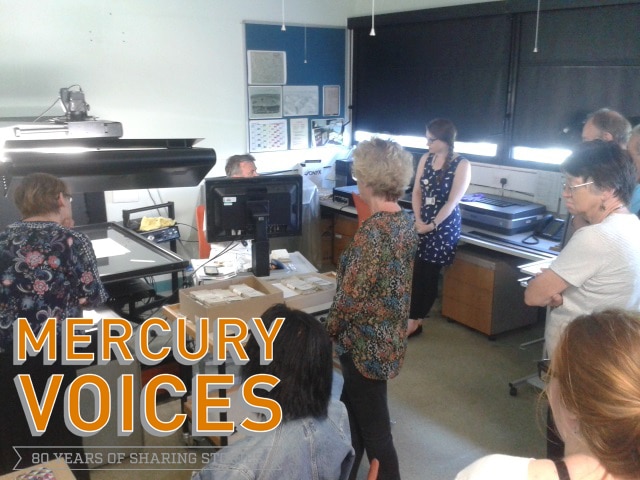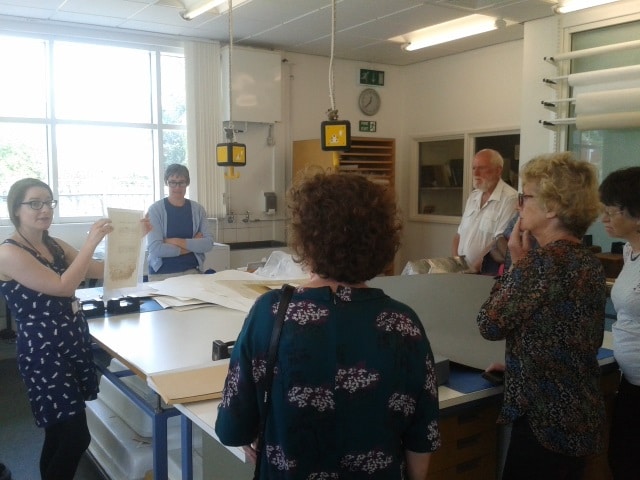
In the second post from Mercury Voices volunteers about our visit to the Essex Record Office (read the first post here), volunteer Holly lets us know what surprised her most about what she saw:
Early in July, our merry band of volunteers took a day trip to the Essex Record Office to see what would happen to our collection once we had handed over custody. And boy did I learn a lot. Too much for one blog post. Here’s the tip of the iceberg on what surprised me the most.
As it turns out, some of the things that make our modern world so efficient cause a lot of headaches for pretty much anyone involved in the preservation of cultural heritage. For example, affordable paper. Something which has made it easier to reproduce documents theoretically should make it easier for archivists to get a copy of the material, right? While that is true, it turns out that is it much harder to preserve modern day paper than linen based paper of the past.
So what is the obvious and easy solution to this problem? Digitisation? You have a copy online where it can live forever and won’t get damaged. Seems simple to us as people not in the world of preservation and restoration. As it turns out there are a lot of problems with this.
1) Storage
Digital storage is not cheap. Having your own server farm is expensive, from equipment, electricity and specialist staff. The other option is Cloud storage, which the Essex Record Office use. This means paying to use someone else’s server farm and you pay for every gigabyte you use. When your office holds hundreds of years’ worth of information about all of Essex… that’s a lot of storage.
2) Prep
To get the documents into a quality that is suitable for digitisation takes time, specialist skills and equipment. That’s a job before you even get near a computer.
3) Equipment
A simple phone camera or scanner will not do. After you think about it for a minute it makes sense. If you want to preserve something (professionals might want to not read this part!) and want it to be good enough to not worry about the original (ok, you’re safe) then it has to be top quality.
4) Time
Not only do you have hundreds of years’ worth of history, you also have the time it takes to prepare every single document, actually digitise it, and then store it in a way which can be accessed and kept safe. This is a generational project, not a five year plan.
5) Future proof
If all that wasn’t enough, you also need to learn how to future proof your document. Despite popular belief, just because something is online does not mean it is going to last forever. The most relevant example is the fact that the Essex Record Office has till 2022 to digitise ALL of their VHS’s. After that most of them will be unable to be read because of degeneration. VHS’s were only brought out in the 1970’s. They are less than 50 years old and soon their contents are going to be lost forever, whereas old fashioned linen paper and parchment can last hundreds of years. The experts know what they are doing with objects and documents, while the digitisation experts are left trying to predict the future of technology.
However, even though digitisation may not be an easy or quick fix, it is very clearly the future of preserving our history and making it accessible to all. It makes history available to the whole world we live in.
To put it into the context of Mercury Voices, it could allow for some of our wartime paper to last thousands of years and not just a few more. A past show performed in Colchester in the 1980’s could be used to inspire a performance in Japan in 2045.
So to sum up, this trip into the inner workings of the Essex Record Office taught me that digitisation may not be easy and may not be quick, but it is worth it and it is something we need to think about when continuing on with our own projects.

A note from the author: Saying all this I am as far from an expert as you can get… this is my thoughts from one tour of an archive. If you happen to be someone, who has stumbled upon this blog, with a bit more experience than me, please get in touch. Always happy for some advice and extra reading!
Want to know more?
To read more about Mercury Voices, or to contact our projects managers, Laura and Claire, please click here.
Newer Blog Post Older Blog Post Back to Blog

